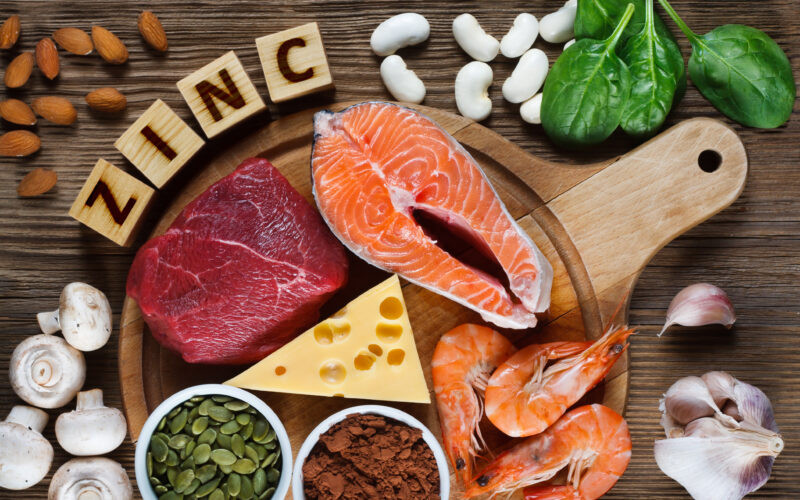Polycystic ovary syndrome (PCOS)—the most prevalent female hormonal disorder—affects somewhere between 10 and 30% of women [1][2]. The precise cause of PCOS, which is characterized by unhealthy cysts in the ovaries, is still unknown—although it does appear to be related to the constellation of issues known as metabolic syndrome. PCOS often presents through irregular cycles, insulin resistance, acne, and excess body hair (hirsutism). As awareness has increased, research on treating the disease has followed suit. Zinc supplements are one potential natural treatment for PCOS. Here’s how and why.
What is zinc?
Zinc is a trace mineral found in many foods. It plays an integral role in the health of all body systems, including the reproductive system, at a cellular level [1]. In fact, zinc is in roughly 3000 proteins. For female hormonal function specifically, zinc helps with ovulation and follicle maturation. It also helps maintain healthy cholesterol and insulin levels.
Women with PCOS are more likely to be zinc-deficient
We know that women who have PCOS are more likely to be deficient in zinc than women without it [3]. According to The PCOS Nutrition Center, some studies demonstrate women with PCOS have lower levels of zinc than women without PCOS, despite having similar dietary intake of zinc. We don’t know whether this is because women with PCOS simply need more zinc than women who don’t, or because their bodies are somehow resistant to it (similar to the concept of insulin resistance or progesterone resistance), or a combination of both.
Zinc helps with PCOS-specific problems
Zinc plays a pivotal role in aiding bodily functions that are classic problem areas for women with PCOS. These include healthy insulin production, androgen levels, thyroid function, and fertility.
Insulin resistance
One of the primary ways zinc can benefit women with PCOS is by preventing or correcting insulin resistance. Insulin resistance affects approximately 70% of women with PCOS. According to the authors of this 2020 research review, zinc plays a critical role in regulating “insulin synthesis, release, action and storage” [2]. They noted that, specifically for women with PCOS, “it was observed to significantly decrease insulin concentration.”
An article at Root Functional Medicine observed that the high prevalence of insulin resistance in women with PCOS may be directly related to the high prevalence of zinc deficiency. A 2015 study found that 220 mg/day of zinc supplementation significantly reduced fasting blood glucose levels and serum insulin levels [4].
High androgen levels
Some of the peskiest PCOS symptoms—including acne, hair loss, and undesired hair growth (hirsutism)—are caused by high androgen (male hormones) levels. Zinc helps block the excess production of androgens, like testosterone, thus, lessening these symptoms. A 2016 study found that supplementing with 50 mg/day of elemental zinc improved hirsutism, though it did not affect hormone levels in the blood [5].
Infertility
Zinc helps the female reproductive system mature follicles and release them in ovulation. Many women with PCOS experience infertility because they are not ovulating. A 2019 systematic review and meta-analysis found that women with PCOS and infertility were more likely to be zinc-deficient than women not struggling with infertility, despite having PCOS [1].
Thyroid
Women with PCOS often also struggle with thyroid issues. Zinc aids the body in utilizing the thyroid hormone, which also plays a critical role in fertility health. It is worth noting that people who struggle with thyroid disease are often advised to supplement with zinc.
There’s some overlap between symptoms of PCOS and of zinc deficiency
Some symptoms of zinc deficiency include skin issues, infertility, hair loss, weight loss, and a weak immune system. Many of these symptoms are also considered PCOS symptoms. We can infer that PCOS and zinc deficiency have a complex relationship, but we don’t yet know whether zinc is beneficial for those with PCOS because the symptoms themselves are caused by low zinc levels or if zinc is specifically important for treating PCOS. Either way, this could explain why zinc may help with PCOS symptoms. If a woman with PCOS were to treat her low zinc levels, she might consequently lessen her PCOS symptoms.
What does the research say about zinc supplementation for PCOS?
Research on zinc’s role in helping PCOS symptoms is relatively new. Most studies have small sample sizes and/or include participants self-reporting their results, both of which could skew the findings. The 2020 research review mentioned above looked at 36 randomized controlled studies on zinc and its relationship with female reproductive system disorders in general [2]. The authors found that zinc supplementation could be a beneficial treatment for PCOS symptoms.
One small 2014 study found that zinc deficiency could play a role in the development of PCOS [6]. The researchers noted that zinc deficiency was a stronger predictor of PCOS than other common PCOS symptoms like high body mass index (BMI) or elevated cholesterol levels because of the prevalence of zinc deficiency among women with PCOS in comparison to those without PCOS. Further research needs to be conducted to fully understand the effects of zinc on the female reproductive system and hormonal disorders, including PCOS.
Zinc and hormonal birth control
Another key point of consideration is that women with PCOS are often treated with hormonal contraception which only masks the symptoms of the disorder. One of many side effects of hormonal birth control is mineral deficiency. Future research should consider how treatment with HBC could exacerbate zinc deficiency in women, and thus increase PCOS severity.
How do I supplement with zinc?
Zinc deficiency is not unique to PCOS. Data from back in 2001 suggested that nearly half of the world is “at risk of zinc deficiency” [7]. The best way to address zinc deficiency is to add foods high in zinc into your diet. Excellent sources include: shellfish, meat, oats, beans, lentils, seeds, nuts, mushrooms, kale, and dark chocolate.
For women with PCOS specifically, discussing a zinc supplement with your doctor may be beneficial given the research mentioned above. It is recommended that adult women consume 8 mg of zinc per day. For those who are pregnant or breastfeeding, 12mg is recommended. If you have PCOS, your doctor may recommend supplementing 15-30mg per day.
It is always best to begin with increasing foods high in zinc into your diet first. A second step would be to discuss supplementation with your healthcare provider to avoid over-supplementation, which can cause gastrointestinal issues and copper deficiency. If your healthcare professional recommends taking a zinc supplement, ensure that it is USP or NSF-certified to make sure what you are ingesting is safe and regulated.
The bottom line on zinc supplementation for women with PCOS
PCOS and zinc have a complicated relationship. Zinc plays a pivotal role in overall bodily function, and zinc deficiency and PCOS share many symptoms. Because of this, evidence suggests that zinc supplementation (or just increasing foods high in zinc into your food) could help treat your PCOS symptoms, especially insulin resistance, acne, excess hair or loss of hair, and thyroid issues.







